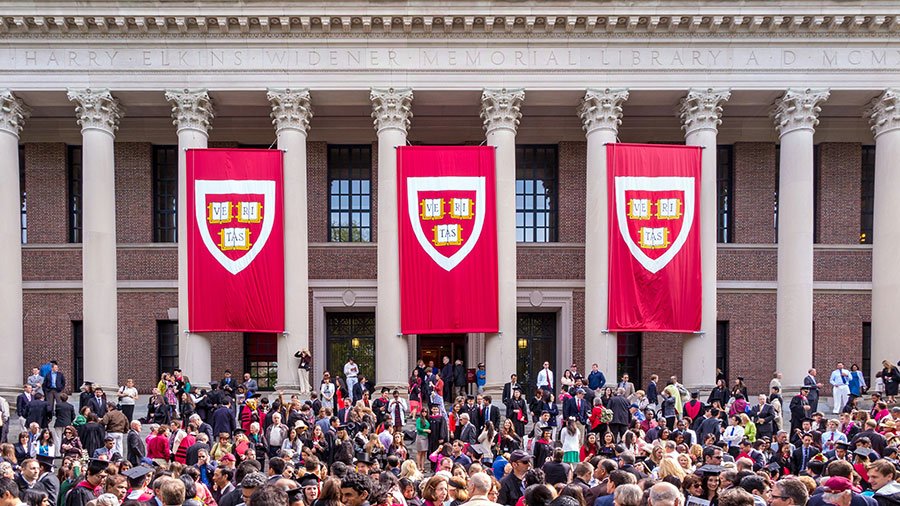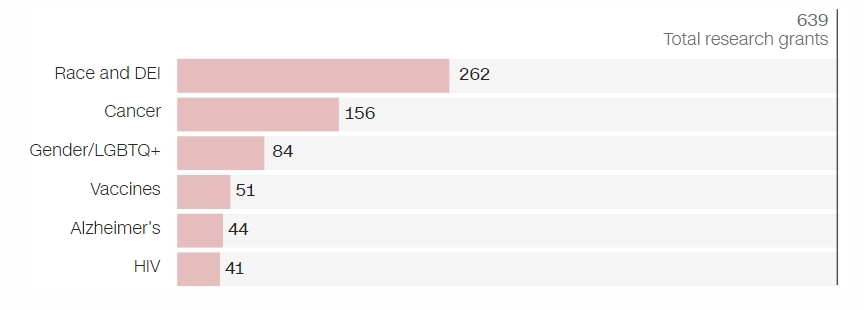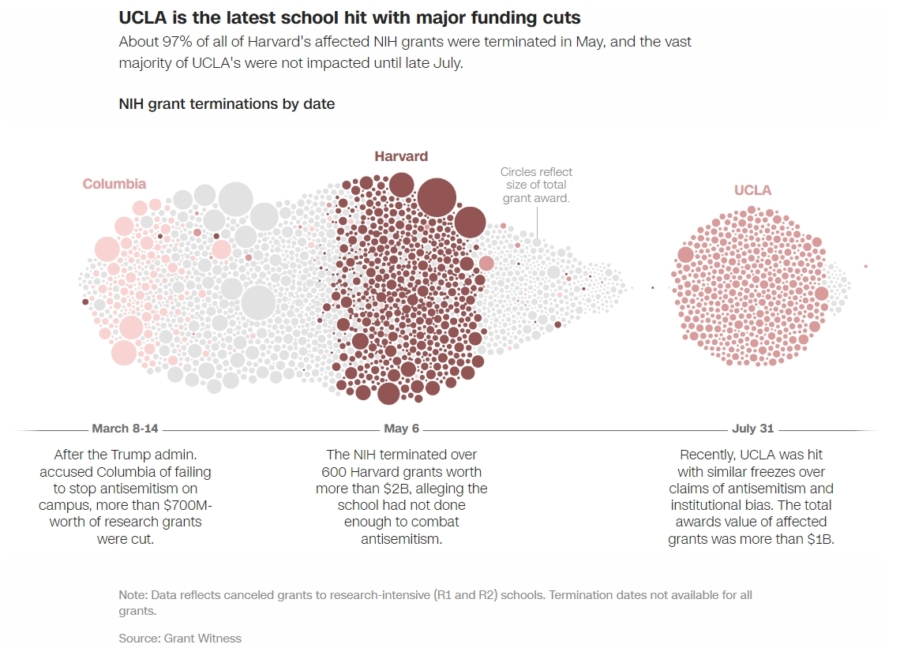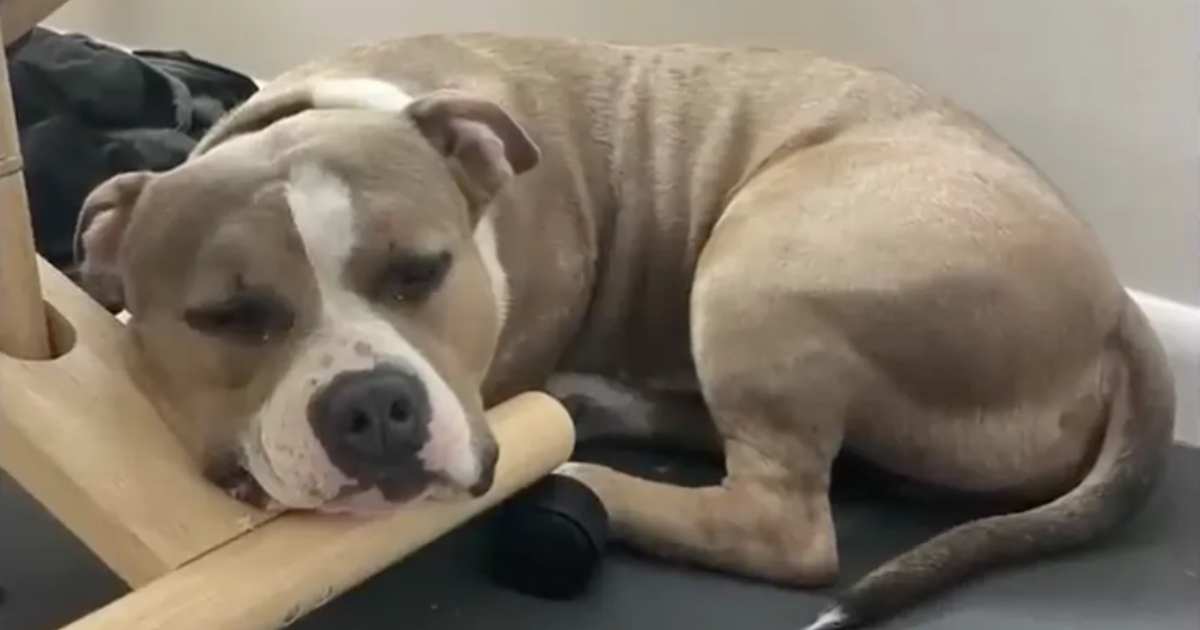

A federal judge on Wednesday gave Harvard University a landmark victory in its fight against the Trump administration, siding with the Ivy League school in its effort to restore more than $2 billion in federal funding for research frozen by the White House.
The decision from US District Judge Allison Burroughs rejects the administration’s argument that it was targeting the university due to antisemitism on the school’s campus.
“A review of the administrative record makes it difficult to conclude anything other than that defendants used antisemitism as a smokescreen for a targeted, ideologically-motivated assault on this country’s premier universities,” wrote Burroughs, an appointee of former President Barack Obama.
“Their actions have jeopardized decades of research and the welfare of all those who could stand to benefit from that research, as well as reflect a disregard for the rights protected by the Constitution and federal statutes,” Burroughs added.
The decision is a major victory for Harvard, the only university targeted by the Trump administration to take on the White House directly in court. The administration has argued it is cracking down on antisemitism on campus, but Harvard has become the epicenter of a broader fight over academic freedom, federal spending and campus oversight.
While Wednesday’s ruling is a major win for the school, the Trump administration is almost certain to escalate its fight against the elite academic institution, prompting longer-term questions about the school’s financial future. Already, the White House said it plans to appeal..
“This activist Obama-appointed judge was always going to rule in Harvard’s favor, regardless of the facts,” White House spokesperson Liz Huston told CNN on Wednesday. “To any fair-minded observer, it is clear that Harvard University failed to protect their students from harassment and allowed discrimination to plague their campus for years.”
In a statement to the Harvard community on Wednesday evening, Harvard President Alan Garber said the ruling “validates our arguments in defense of the University’s academic freedom, critical scientific research, and the core principles of American higher education,” but acknowledged some uncertainty ahead.
“Even as we acknowledge the important principles affirmed in today’s ruling, we will continue to assess the implications of the opinion, monitor further legal developments, and be mindful of the changing landscape in which we seek to fulfill our mission,” Garber said.
Burroughs pointed to some of the research projects impacted by the administration’s cuts, including efforts to create a predictive model to help emergency room physicians at the Department of Veterans Affairs determine whether suicidal veterans should be hospitalized, research on Lou Gehrig’s Disease, the development of a chip to measure NASA astronauts’ radiation exposure on an upcoming excursion to the moon and support for a government program on emerging biological threats.

“There is no obvious link between the affected projects and antisemitism,” the judge said.
When the funding was frozen, Burroughs added, there was no investigation into whether any particular research labs, she said, “were engaging in antisemitic behavior, were employing Jews, were run by Jewish scientists, or were investigating issues or diseases particularly pertinent to Jews, … meaning the funding freezes could and likely will harm the very people Defendants professed to be protecting.”
She also took aim at numerous Trump social media posts. His concerns about Harvard, she said, “were untethered from antisemitism,” quoting many of them directly.
In her ruling, Burroughs wiped away a “Freeze Order” the administration issued in April that would have held up more than $2 billion multi-year grants to the university and barred the government from withholding any additional federal funds “to Harvard in retaliation for the exercise of its First Amendment rights, or on any purported grounds of discrimination without compliance with the terms of Title VI.”
Burroughs made clear in her opinion that she viewed combating antisemitism as an important goal. Harvard, she wrote, “was wrong to tolerate hateful behavior for as long as it did.”
“The record here, however, does not reflect that fighting antisemitism was defendants’ true aim in acting against Harvard and, even if it were, combatting antisemitism cannot be accomplished on the back of the First Amendment,” she wrote.

Settlement talks over the summer
Officials from Harvard and the White House this summer have been in discussion toward a high-dollar deal to restore all federal funding and eliminate ongoing lawsuits – including a separate lawsuit with the Trump administration over the university’s ability to enroll international students. Burroughs ruled in Harvard’s favor in that case, though the decision didn’t preclude the administration from undertaking a formal review process that could eventually result in the university being unable to host foreign students and scholars.
Last week, Trump publicly called for Harvard to pay “nothing less than $500 million,” telling his Education Secretary Linda McMahon, “They’ve been very bad. Don’t negotiate.”
Other schools targeted by the administration this year, many of which are experiencing acute financial pressure, have taken less confrontational approaches than Harvard.
In a deal reached in July, Columbia University agreed to pay the US Treasury a $200 million settlement to restore all federal funding. The school also agreed that an independent monitor will oversee implementation. Days later, Brown University reached a deal in which it would pay Rhode Island workforce development organizations $50 million.
The White House remains in negotiation with Cornell University and Northwestern University, and in early August, CNN learned that the Trump administration is seeking a $1 billion deal with the University of California, Los Angeles. The school’s leadership said at the time that sum would devastate the university.
The Trump administration has also been seeking new and creative ways to pressure Harvard, including by targeting the school’s patents.
Speaking at a Cabinet meeting last week, Commerce Secretary Howard Lutnick pointed to those efforts as a way Trump’s team works together across agencies.
“I mean, we just have a blast, you know? Because Linda’s hitting Harvard, and she says, ‘What can we do?’ Now we send them a patent letter and hit them again. So we’re having fun together,” Lutnick said.

$2.4B of Harvard’s canceled research grants, visualized
As Harvard University and the Trump administration negotiate a funding stalemate, billions of dollars of research grants hang in the balance.
The two sides have only weeks left before a September 3 deadline, when a judge has been asked to rule on whether the government’s $2-billion-plus rollback of federal research funding violated Harvard’s First Amendment rights.
While the Trump administration has axed funding to dozens of schools, few have as much at stake as Harvard. The total value of affected Harvard University grants sits at around $2.4 billion, according to a CNN analysis of data from Grant Witness, a volunteer effort tracking grant terminations from the National Institutes of Health and the National Science Foundation. Grant Witness collects data by combining firsthand reports from scientists with information released in federal databases and other official sources.
Only Harvard has taken on the White House directly in court. Other prominent schools have backed out of the fight and opted for settlements. In July, Columbia agreed to pay more than $220 million to restore as much as $2.6 billion in grant funding, according to Grant Witness’ records through August 19. Other Ivy League schools, such as Brown University and the University of Pennsylvania, have also struck deals with the administration to restore funding.
The Trump administration was optimistic about the possibility of reaching a deal with Harvard after it announced the settlement with Columbia.
“While there’s a lawsuit pending with Harvard, and I’m sure that lawsuit will play out, I do hope that Harvard will continue to come to the table with negotiations. Those talks are continuing, and we’d like to have a resolution there, outside of the courts,” Education Secretary Linda McMahon said in a phone interview with CNN in July.
The case has become a flashpoint in a major clash over academic freedom, campus oversight and federal funding.
Although $2.4 billion represents the total value of Harvard’s canceled grants, a better measure of the research impact is the unspent grant funds. Grants from the NIH and NSF are often multi-year, typically doling out money annually over time. The unpaid frozen or terminated funds represent an estimated $1.3 billion that scientists were counting on to continue their research. While some groups have launched successful legal challenges on a case-by-case basis to restore funding, it’s currently unclear if any of Harvard’s grants have been reinstated or to what degree. Harvard did not respond to a request for comment.
Affected Harvard grant funds by status

A wide range of research areas have been affected across Harvard’s scientific projects, including ALS research, cancer studies and research into emerging biological threats. The Trump administration cut billions of dollars in grants following what the White House said was a breakdown in discussions over combating antisemitism on campus and other ideological disagreements.
Many of the canceled grants may have involved topics like gender identity and DEI initiatives, and systemic inequality and marginalized communities — subjects that have become frequent targets of criticism from President Donald Trump and conservative lawmakers.
While it’s unclear how the administration chooses grants to terminate, Grant Witness tracks grants that contain key words that the New York Times has reported the administration has sought to limit or avoid in the federal government. These words could appear in the grant’s title, abstract or public health relevance statement and may have been used to identify grants for termination.
More than a third of the 639 canceled Harvard NIH grants contained keywords associated with the topics of race and Diversity, Equity and Inclusion (DEI).
Hundreds of canceled Harvard grants contain politically sensitive words
Grant Witness tracks grants that contain key words the administration has reportedly sought to limit or avoid and may have used to identify grants for termination. Some grants may be included in multiple categories.
Number of affected Harvard NIH grants with related words

Note: Some words may have multiple meanings in science (e.g. bias) or may be matched to parts of words (e.g., “trans” in “transcription”). Categories are not mutually exclusive. Grant Witness searched grant records for words that the New York Times identified that Trump administration agencies have flagged to limit or avoid. Grant Witness supplemented the word list with variants of the words “vaccine,” “hesitancy,” and “mRNA”.
More recently, the White House has raised the stakes again, bringing the University of California, Los Angeles (UCLA) into its battle to pressure higher education and extract significant concessions from universities. On July 31, the government canceled a wave of grant funding at UCLA, working out to about $1.2 billion in total awards value, with about half of that yet to be paid out to researchers, according to estimates from Grant Witness.
UCLA reported approximately $584 million in funding was at risk in early August. To restore its research grants, the Trump administration is seeking a $1 billion settlement from UCLA, among other concessions, which, if agreed to, would mark the biggest settlement it has received from a higher education institution to date. However, a federal judge has already ruled against some of the grant cancellations. Earlier this month, California district court judge Rita F. Lin ordered the NSF to restore a portion of the suspended grants at UCLA and the University of California and blocked further cancellations for the school system. UCLA did not respond to CNN’s request for comment.

As the September 3 court deadline looms, many are pushing for Harvard to see the legal battle through. Earlier this month, a letter signed by over 14,000 Harvard alumni, faculty, students and members of the public urged the university to reject any deal with the Trump administration that “cedes the university’s autonomy.” However, representatives from both Harvard and the administration have engaged in private talks about finding a way out of their legal standoff, according to CNN reports.
So far, Harvard hasn’t capitulated. President Alan Garber told faculty that retaining its academic freedom remains nonnegotiable, according to the student-run Harvard Crimson newspaper. Three faculty members familiar with the matter told the Crimson that Garber said he prefers to resolve the dispute in court.
“Neither Harvard nor any other private university can allow itself to be taken over by the federal government,” Garber wrote in April.




:max_bytes(150000):strip_icc():focal(736x275:738x277):format(webp)/sydney-towle-120525-2-a3f5696600514167b3e038d003990333.jpg?w=1200&resize=1200,0&ssl=1)



:max_bytes(150000):strip_icc():focal(624x0:626x2)/john-mccain-7dd4d3a525224e238f883e28d86bb19b.jpg?w=1200&resize=1200,0&ssl=1)









:max_bytes(150000):strip_icc():focal(866x128:868x130)/pregnant-woman-012825-45c9d96767384189b7f7bc2523a7a9e0.jpg?w=1200&resize=1200,0&ssl=1)












:max_bytes(150000):strip_icc():focal(999x0:1001x2)/catherine-ohara-013026-7-4b5b413a646d4f15a1fd15ac8b933811.jpg?w=1200&resize=1200,0&ssl=1)








